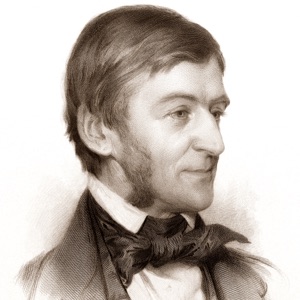
Ralph Waldo Emerson (1803 – 1882) was an American essayist, lecturer, philosopher, and poet who led the transcendentalist movement of the mid-19th century. Emerson served as a junior pastor in Boston’s Second Church, but after his first wife’s death, he began to disagree with the church’s methods, eventually leading to his resignation. Upon his return home from a tour of Europe in 1833 he began writing his first published essay, Nature. In March 1837 Emerson gave a series of lectures on the philosophy of history in Boston, which began his career as a lecturer. He eventually gave as many as 80 lectures a year, traveling across the United States. He disseminated his thoughts through dozens of published essays and more than 1,500 public lectures.

Quotes by Ralph Waldo Emerson…
Every step so downward, is a step upward. The man who renounces himself, comes to himself.
A man contains all that is needful to his government within himself. He is made a law unto himself. All real good or evil that can befall him must be from himself… The purpose of life seems to be to acquaint man with himself. He is not to live to the future as described to him, but to live in the real future by living to the real present. The highest revelation is that God is in every man.
Character is the habit of action from the permanent vision of truth. It carries a superiority to all the accidents of life. It compels right relation to every other man — domesticates itself with strangers and enemies.
Man stands in strict connection with a higher fact never yet manifested. There is power over and behind us, and we are the channels of its communications… This open channel to the highest life is the first and last reality, so subtle, so quiet, yet so tenacious, that although I have never expressed the truth, and although I have never heard the expression of it from any other, I know that the whole truth is here for me.
We live in succession, in division, in parts, in particles. Meantime within man is the soul of the whole; the wise silence; the universal beauty, to which every part and particle is equally related; the eternal One.
The less a man thinks or knows about his virtues the better we like him.
I must be myself. I cannot break myself any longer for you, or you. If you can love me for what I am, we shall be the happier. If you cannot… I will not hurt you and myself by hypocritical attentions. If you are true, but not in the same truth with me, cleave to your own companions; I will seek my own. I do this not selfishly but humbly and truly. It is alike your interest, and mine, and all men’s, however long we have dwelt in lies, to live in truth. Does this sound harsh today? You will soon love what is dictated by your nature as well as mine, and if we follow the truth it will bring us out safe at last.
Wise men read very sharply all of your private history in your look and gait and behavior.
Society never advances. It recedes as fast on one side as it gains on the other.
It is easy in the world to live after the world’s opinion; it is easy in solitude to live after your own; but the great man is he who, in the midst of the crowd, keeps with perfect sweetness the independence of solitude.
